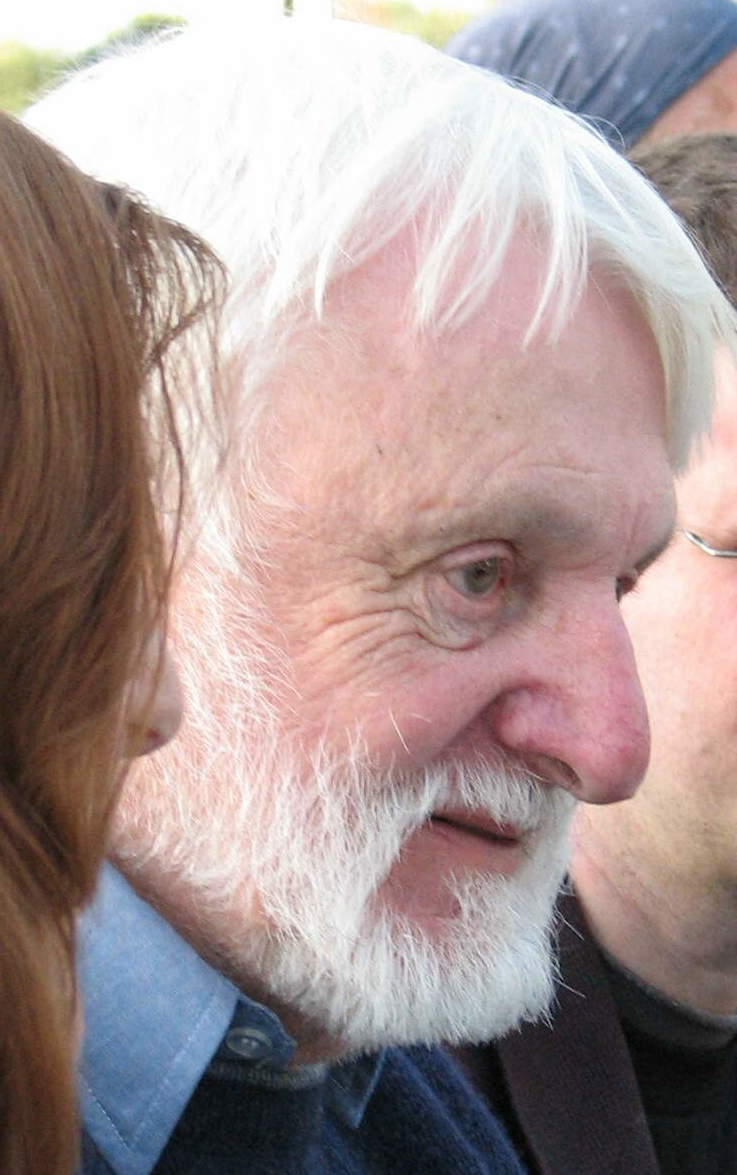
Robert M. Pirsig
Robert Maynard Pirsig (/ˈpɜːrsɪɡ/; September 6, 1928 – April 24, 2017) was an American writer and philosopher. He is the author of the philosophical novels Zen and the Art of Motorcycle Maintenance: An Inquiry into Values (1974) and Lila: An Inquiry into Morals (1991), and he co-authored On Quality: An Inquiry Into Excellence: Selected and Unpublished Writings (2022) along with his wife and editor, Wendy Pirsig.[1]
Robert M. Pirsig
Robert Maynard Pirsig
September 6, 1928
Minneapolis, Minnesota, U.S.
April 24, 2017 (aged 88)
South Berwick, Maine, U.S.
- Writer
- philosopher
Guggenheim Fellowship (1974)
3
Maynard Pirsig (father)
Early life[edit]
Pirsig was born on September 6, 1928, in Minneapolis, Minnesota,[2] the son of Harriet Marie Sjobeck and Maynard Pirsig. He was of German and Swedish descent.[3] His father was a graduate of the University of Minnesota Law School, taught in that school from 1934, served as its dean from 1948 to 1955, and retired from teaching there in 1970.[4] He subsequently taught at the William Mitchell College of Law until his retirement in 1993.[4]
A precocious child with an alleged IQ of 170 at the age of nine, Pirsig skipped several grades at the Blake School in Minneapolis.[3][5] In May 1943, Pirsig was awarded a high school diploma at the age of 14 by the University High School (later renamed Marshall-University High School), where he had edited the school yearbook, the Bisbilla. Pirsig then studied biochemistry at the University of Minnesota. In Zen and the Art of Motorcycle Maintenance, he describes the central character, thought to represent himself,[6] as being an atypical student, interested in science in itself rather than a professional career path.
In the course of his studies, Pirsig became intrigued by the multiplicity of putative causes for a given phenomenon, and increasingly focused on the role played by hypotheses in the scientific method and sources from which they originate. His preoccupation with these matters led to a decline in his grades and expulsion from the university.[7]
In 1946, Pirsig enlisted in the United States Army and was stationed in South Korea until 1948. Upon his discharge from the Army, he lived for several months in Seattle, Washington, and then returned to the University of Minnesota, from which he received a bachelor's degree in 1950.[8] He subsequently studied philosophy at Banaras Hindu University in India and the Committee on the Analysis of Ideas and Study of Methods at the University of Chicago. In 1958 he earned a master's degree in journalism from the University of Minnesota.[7][9]
Personal life[edit]
Robert Pirsig married Nancy Ann James on May 10, 1954. They had two sons: Chris, born in 1956, and Theodore (Ted), born in 1958.[10]
Pirsig had a mental breakdown and spent time in and out of psychiatric hospitals between 1961 and 1963. He was diagnosed with schizophrenia and treated with electroconvulsive therapy on numerous occasions,[7] a treatment he discusses in Zen and the Art of Motorcycle Maintenance. Nancy sought a divorce during this time;[19] they formally separated in 1976 and divorced in 1978.[10] On December 28, 1978, Pirsig married Wendy Kimball in Tremont, Maine.
In 1979, his son Chris, who figured prominently in Zen and the Art of Motorcycle Maintenance, was fatally stabbed in a mugging outside the San Francisco Zen Center at the age of 22.[20] Pirsig discusses this tragedy in an afterword to subsequent editions of Zen and the Art of Motorcycle Maintenance, writing that he and his second wife Wendy Kimball decided not to abort the child they conceived in 1980 because he believed that this unborn child – later their daughter Nell – was a continuation of the "life pattern" that Chris had occupied.[21]
Death[edit]
Pirsig died aged 88, at his home in South Berwick, Maine, on April 24, 2017, after a period of failing health.[1]
Legacy and recognition[edit]
Pirsig received a Guggenheim Fellowship in 1974 for General Nonfiction,[22] which later allowed him to complete his second book. The University of Minnesota conferred an Outstanding Achievement Award in 1975.[23] He won an award for literature from the American Academy and Institute of Arts and Letters in 1979.[24]
On December 15, 2012, Montana State University bestowed upon Pirsig an honorary doctorate in philosophy during the university's fall commencement. Pirsig was also honored in a commencement speech by MSU Regent Professor Michael Sexson.[25][26] Pirsig had been an instructor in writing at what was then Montana State College from 1958 to 1960.[27]
Pirsig did not travel to Bozeman in December 2012 to accept the accolade, allegedly due to frailty of health.[10][28] However, in Zen and the Art of Motorcycle Maintenance, Pirsig writes about his time at Montana State College as a less than pleasurable experience, and that this limited his ability to teach writing effectively and to develop his own philosophy and writing.
In December 2019, the Smithsonian's National Museum of American History acquired Pirsig's 1966 Honda CB77 Super Hawk on which the 1968 ride with his son Chris was taken. The donation included a manuscript of Zen and the Art of Motorcycle Maintenance, a signed first edition of the book, and tools and clothing from the ride.[29] In April 2024 Pirsig's bike went on public display for the first time ever, in the museum's exhibition "America on the Move", along with the book's original manuscript, Pirsig's manual typewriter and an Apple II computer to which he made extraordinary upgrades that earned him the honor of a room named for him — the Pirsig Meeting Room — at Apple headquarters.[30] In 2020, the Smithsonian acquired additional material from the Pirsig family relating to Pirsig's maritime interests and background, also included in the display.[31] In 2020, the Robert M. Pirsig archive was collected by the Houghton Library at Harvard University, Cambridge, Massachusetts;[32] a 2021 article in the International Journal of Motorcycle Studies details the writer's close historic relationship with motorcycles from the age of four to shortly before his death.[33]